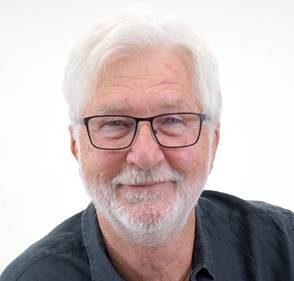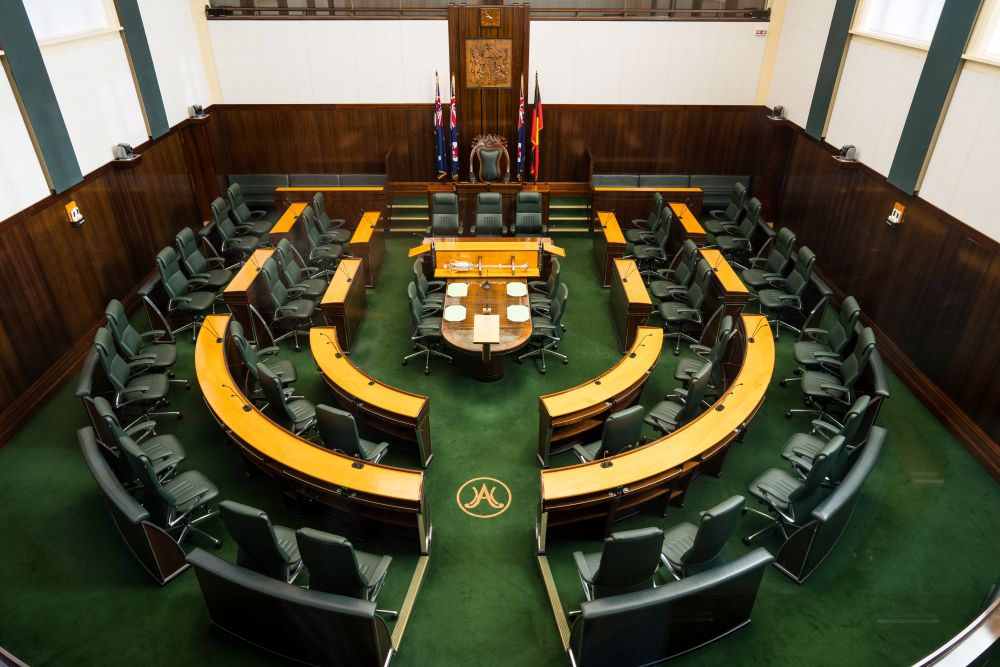Peter George MP
House of Assembly

Mr GEORGE (Franklin) - Thank you, honourable Speaker and members. May I just say that humble is not an adjective often associated with me, I'm afraid to say, so I hope you'll forgive me if I'm honest and forthright instead.
If I may briefly introduce myself, I'm the son of a British sailor and an Australian mum. I have not, as some people on social media seem to think, come from another planet. I was schooled around the world and my accent is, of course, a dead giveaway. I am not Tasmanian by birth, but I think I'm Tasmanian by choice.
I will start by paying my respects to this island's First Nations people and may I say I will try hard to be of service in any way that you may ask me. Your resilience in the face of so many past and present tragedies and your fight for recognition and rights deserves respect and our full attention.
Fear not, this is 11 pages, but I will run through them. I would like to speak off the cuff, but notes keep me much shorter.
A short history of my political schooling. My first contact with politics in the raw was in 1968 or 1969, when The Sydney Morning Herald sent me to interview Liberal prime minister John Gorton. I was a teenager of either 17 or 18 years old, never having been to university. He was the prime minister with a gnarled face scarred from a fighter plane accident. I was so intimidated I could hardly stutter out a question. The prime minister took pity on me. 'Would you like me to ask the questions?', he asked. 'Yes, please', said I. He said, 'So, Prime Minister, what did you achieve on your trip?', and then he answered, 'Well, thank you for asking that question, Peter'.
Leap forward to 11 November 1975, 50 years ago this year. I was standing close to Gough Whitlam's right shoulder on the steps of the old wedding cake Parliament House. He was intoning:
'God save the Queen, because nothing will save the Governor-General.'
This was, of course, our great constitutional crisis. As the afternoon wore on into evening, thousands gathered on the lawns. There was rebellion in the air. There were calls to 'take the bloody doors off'' Parliament House, but Australians are pragmatic if nothing else, and they understand their priorities. At around 9.00 p.m., the word went around, 'Jesus, the pubs will be closed in an hour', and the crowd and the aggression subsequently diminished.
In the years since, I have reported politics around the world. When the people's representatives get it right, then everyone does prosper. When they get it wrong, everyone suffers. I watched Margaret Thatcher's government send in mounted police as whole communities of miners were ripped apart. I will say she ripped me apart in an interview I did with her too. I sat with Thai villagers explaining why no-one should be allowed to buy their votes. In Kurdistan, I witnessed the day when the Kurdish people, brutally repressed and gas- bombed by Saddam Hussein, went to the polls for the first time in their 5000-year-old civilisation. In the streets of Manila, I reported Cory Aquino's 'people power revolution' as it peacefully overthrew the dictator, Ferdinand Marcos.
As a correspondent, I may have witnessed more hate or famine, death and bloodshed than is good for anyone to see. Where others were fleeing from oppression and war, I found myself travelling in the opposite direction to witness tragedy in Rwanda, Bosnia, Afghanistan, Gaza, Lebanon, Iran and Iraq. I've witnessed what happens when civilised behaviour and the rule of law collapses.
Now, when I walk into this parliament, I expect to witness something different. There are 34 other MPs in this House and 15 in the other place, working through their differences - philosophical, ideological, political. Each of us, along with our staff, the parliamentary staff and the whole public service, are performing a democratic duty to make this island a better, stronger and more equal place for today's Tasmanians and for generations to come. It is a privilege and it's a burden and it occupies my waking thoughts much of the time.
As a reporter, politics is and has always been a wonderful Shakespearean-style story. It's the story of the rise and fall of great men and women and of fools and scoundrels, of political moments and movements. It's also the story of the fall of prime ministers, autocrats, dictators, and, dare I say it, even of premiers and opposition leaders. A reporter by trade, I've witnessed it all, yet here I am, standing with you, rolling up my sleeves in the hope that we can say we did a good job for four years. However, I was forewarned that it will be four difficult, long years.
Credit for my presence in this House goes, of course, to my campaign team, my supporters, my constituents, my friends here today, and my wife. Also credit to the honourable federal Minister for Fisheries, Julie Collins, federal MP for my electorate of Franklin. Had she once in 10 years accepted my community's invitation to meet and explore our concerns about industrial salmon, I'd never have thought of standing in a federal or a state election.
Credit too, unfortunately, to members of this House who didn't bother to visit distressed communities over summer as rotting flesh from salmon and fat washed up on our foreshores. Yet they did find time to spruik for the multinationals, whose disastrous practices led to disease, billions of dead salmon and antibiotic dumps in our waterways. The salmon packs that some of you held up for the cameras were probably diseased.
I had no notion when I first stood of the wellspring of frustration that I tapped, not just at the destruction of marine life and waterways, but over two parties who seemed to be serving corporate interests and masters rather than their constituents. Tasmanians had a right to expect better of you. Their verdict was delivered through the ballot box.
The threat to Brand Tasmania is real. The salmon industry's reputation is now so toxic, that even advertising agencies - no angels themselves - are wary of working with them. Common sense tells us the multinationals' owners will soon be gone, conquered by warming waters, rampant disease, uncontrolled mortalities, the collapse of social licence and, of course, vanishing profits.
If we really care about regional workers and regional communities, we should be acting now to ease the transition that is inevitable. Together we can end the destruction of an island's marine heritage and look after the impacted communities. That is common sense. That's where our duty lies. Sure, it will take wisdom and will and collaboration, but that's what minority government is all about. That's what makes minority government successful.
I fear that Tasmanians increasingly agree with Aristophanes that under every stone lurks a politician. They have reason for cynicism. Tasmania is the home of backroom deals; of revolving doors between government lobbyists, corporate multinationals, parliamentarians; of public consultations that amount to no consultation at all; of reviews stitched up before they're launched or ignored when they are completed; of decent people tasked with upholding public integrity and accountability stymied by the lack of resources and personnel; of Liberals behaving as if they are the state's natural rulers, dispensing favours to corporate mates while their constituents perceive them as ever more remote; of Labor equally as guilty and now on some sort of listening exercise around the state as if 11 years in the political wilderness wasn't a long enough time to hear the voice of Tasmanians. If my election doesn't send that message to Labor and Liberal as a clear, clear message, their decline will be guaranteed, and their relevance minimal.
There was a frog in a flood who offered to carry a scorpion across the river if the scorpion promised not to sting. Halfway across, the scorpion struck. 'Why?' asked the dying frog.
'Because I'm a scorpion.' I set out on these next four years with that story in mind. Like the frog, I believe that collaboration between Tasmania's different political species would deliver the most optimal outcome. I believe the Independents in this House think the same way.
However, we are not as incautious or naive as that frog. We recognise the Machiavellian nature of Tasmanian politics, where political cunning is too often mistaken for political wisdom. Trust takes a long time to build and can be destroyed in moments. We will absolutely hold this government to account. Should our goodwill be abused, we will be ever more diligent, ever more forthright in our opposition. It's what Tasmanians expect and it's what they need.
The task of the next four years is, I confess, daunting. We appear on the brink of financial collapse from which only federal intervention may save us. I can't think of anything more irresponsible than a government and opposition collaborating to squander $1 billion or
$2 billion on a vanity project like the Macquarie Point stadium - when 5000 people are waiting up to 97 weeks for a proper roof over their heads; when our health system is failing the sick and the elderly; when the budget is in meltdown; and when by taking a leaf out of the Scandinavian experience of community development, Macquarie Point could so easily become not just the pride of Tasmania but the envy of Australia.
I've heard the delusion in this House today that the majority of Tasmanians voted for you to show support for the stadium. That is seriously deluded. Everyone knows we can get a team with or without a stadium.
We all know the pressing problems: health, education, housing, cost of living. Common sense tells us that we can't go on logging native forests, ignoring the social and economic impact of global warming, the destruction of waterways, the threat of uncontrollable bushfires. It calls for a laser-like focus on the challenges and determination to tackle the issues from across the political divide. That's what minority government is all about. If it works globally, why the hell can't it work here? Tasmanians will watch and judge us.
I believe we can at least start down the road of a new way of doing politics in Tasmania by addressing some of the issues that may more easily find consensus. With a fit-for-purpose Integrity Commission properly resourced and funded, we could implement excellent new lobbying rules. Right to information, frankly in this state, is oxymoronic. Let's agree the McCormack-Snell review is fully implemented by the government. With greater accountability and transparency across all aspects of public life and decision-making, we begin to rebuild public trust in the system, and in us.
I know there have been willing hands in both Chambers of parliament, who have been toiling away with this end in focus and it's time they were rewarded. I also believe that by the end of this parliament, Tasmania should have brought a human rights act into law, long overdue and essential to the political life of Tasmania and the freedoms we too often take for granted.
When I look around the Chamber of all you young folk, I realise I'm the one in a hurry. I've got much less time than you have. That's why I'm so eager to get things done. Friar Laurence warned us to act: 'Wisely and slow, they stumble that run fast,' but I do want to run fast. As you will have noticed last week, I have also stumbled. I want to help sow the seeds of a better future for my adopted island. If we don't, the next four years will be purgatory for me.
I sincerely believe that each one of us actually wants this parliament to survive four years and that our constituents, all Tasmanians, will understand when they look back that not only did we strive to make our island a more prosperous, happy, liveable state, but that we have set a course for achieving just that outcome.
There are no true friends in politics, says Cicero, and it's hard to argue with that but we don't have to be friends. It may make some of you choke on your morning Coco Pops, but that would make you and me allies. Hard to believe, perhaps, but allies in a worthwhile cause. We have to decide to work together for the common good.
Norm Kirk was an engine driver who became Prime Minister of New Zealand, another country from which I reported. He said, 'Most people can be happy with a roof over their heads, something to do, someone to love, something to hope for'. We could do a lot worse than starting with that in mind and then building on it. Thank you.

